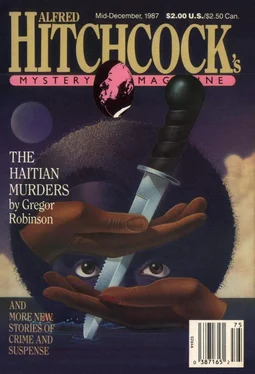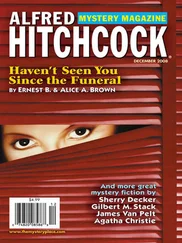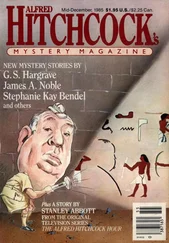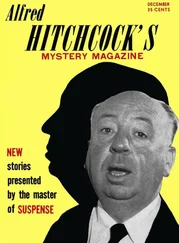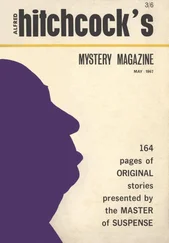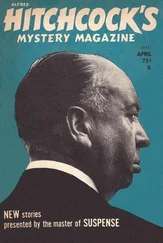Doug Allyn - Alfred Hitchcock’s Mystery Magazine. Vol. 32, No. 13, Mid-December, 1987
Здесь есть возможность читать онлайн «Doug Allyn - Alfred Hitchcock’s Mystery Magazine. Vol. 32, No. 13, Mid-December, 1987» весь текст электронной книги совершенно бесплатно (целиком полную версию без сокращений). В некоторых случаях можно слушать аудио, скачать через торрент в формате fb2 и присутствует краткое содержание. Город: New York, Год выпуска: 1987, ISBN: 1987, Издательство: Davis Publications, Жанр: Детектив, Триллер, на английском языке. Описание произведения, (предисловие) а так же отзывы посетителей доступны на портале библиотеки ЛибКат.
- Название:Alfred Hitchcock’s Mystery Magazine. Vol. 32, No. 13, Mid-December, 1987
- Автор:
- Издательство:Davis Publications
- Жанр:
- Год:1987
- Город:New York
- ISBN:ISSN: 0002-5224
- Рейтинг книги:5 / 5. Голосов: 1
-
Избранное:Добавить в избранное
- Отзывы:
-
Ваша оценка:
- 100
- 1
- 2
- 3
- 4
- 5
Alfred Hitchcock’s Mystery Magazine. Vol. 32, No. 13, Mid-December, 1987: краткое содержание, описание и аннотация
Предлагаем к чтению аннотацию, описание, краткое содержание или предисловие (зависит от того, что написал сам автор книги «Alfred Hitchcock’s Mystery Magazine. Vol. 32, No. 13, Mid-December, 1987»). Если вы не нашли необходимую информацию о книге — напишите в комментариях, мы постараемся отыскать её.
Alfred Hitchcock’s Mystery Magazine. Vol. 32, No. 13, Mid-December, 1987 — читать онлайн бесплатно полную книгу (весь текст) целиком
Ниже представлен текст книги, разбитый по страницам. Система сохранения места последней прочитанной страницы, позволяет с удобством читать онлайн бесплатно книгу «Alfred Hitchcock’s Mystery Magazine. Vol. 32, No. 13, Mid-December, 1987», без необходимости каждый раз заново искать на чём Вы остановились. Поставьте закладку, и сможете в любой момент перейти на страницу, на которой закончили чтение.
Интервал:
Закладка:
Young Bob Swillet desperately desired to get in on that kind of quick leap upward. Now he could. His weekends were free (he studied law at night). In new quarters, a dollar a week, over a second-hand bookshop in Greenwich Village, embarked on his law studies, making headway at the law firm, he was at last ready to roll.
Again the seasons waxed and waned. Came and went. Sang their brief song and then vanished. Oh, wortmen still fell into vats, widows slipped on icy church steps, and spindly orphans yelled, “Hextrey, hextrey, read hall ’bout hit... Milwaukee Butter en Egg typhoon found dead in love nest on 38th Street, hextrey,” but life was pretty good for Bob Swillet.
Alas (again; too bad, but this is a true story and we cannot eliminate all alases — that’s the way life is, a hi-ho the merry-o today, an alas tomorrow), it was not to endure. The market crashed in late October, 1929. Mr. Higgins, Bob’s mentor — “we have our eye on you, Swillet” — abruptly departed via a window in his fifteenth floor office. Mr. Halliburton took charge.
“Have Swillet sweep up the glass and mop up the blood,” he ordered. A fawning flunky rushed downstairs to the mail room where Swillet was busily stamping the outgoing mail with his left hand while industriously scrubbing the ten gallon coffee urn with his right hand.
Two months later — less than that actually, it was only a few days after a somewhat sober Christmas party — Mr. Halliburton, a dapper bachelor, also departed, taking with him a little over sixty-seven point five percent of the firm’s cash and one hundred percent of vivacious Mrs. (Liz) Sweetcove, wife of Mr. (“Cities Service will go to 300, mark my words”) Sweetcove.
This came as a shock to everyone, especially to Mr. Sweetcove, who brooded for a week or ten days and then he, too, left, leaving behind a cryptic note to the effect that he was renouncing the world and was departing on the morrow for Kentucky to join a silent-monk monastery. Good God, his associates gasped, what next?
That left only Mr. Whitehurst and very little cash. Bob Swillet worried. And every night he prayed to a trio of saints who looked after lawyers, St. Ivo, St. James, St. John Bosco. Please take care of Mr. Whitehurst, he begged, please. No use. It seemed to be fate. Nothing the saints could do, the verdict was a foregone conclusion. You win some, you lose some. Mr. Whitehurst lost the big one on a lovely lazy summer afternoon in 1930 on Long Island Sound when the boom of his sailing vessel... well, naturally the firm collapsed.
Staggering home in the brooding twilight of the day the firm closed, Bob Swillet was in such a deep daze that he failed to see the huge manila envelope right in front of him, on the sidewalk, forget the gutter. He actually nearly tripped over it. Thirty seconds later a sharpeyed newsboy — a skinny orphan from Jersey City — scooped it up and the very next morning he returned it to the offices of J. P. Morgan and Co. and was given an immediate reward of five dollars plus a solemn promise of a scholarship to Harvard Law School when he was old enough, a fair exchange for having returned only seven hundred eighty-seven thousand dollars in fifty and hundred dollar bills. It paid to be honest.
More bad news awaited Bob at home. Another large envelope. This one from the mail order law college in Cedar Rapids. Thank God, the poor fellow thought jubilantly as he frantically opened the envelope. My diploma at last (he had been anxiously awaiting his sheepskin since mailing in his final exam (Mrs. Hyatt Wyatt III versus Farmer Ezra Brown, a suit in Contracts, a matter of foul eggs). Bob had found for Mrs. Wyatt III, who had contracted with Farmer Brown for two dozen white eggs a week at twelve cents a dozen. Mrs. Wyatt Ill’s complaint was that Farmer Brown was sneaking too many brown eggs into the weekly basket.
Alas, there was no diploma. Merely a brief announcement stating that the school could no longer issue law degrees under orders from the U.S. Attorney General (Harvard, Columbia, Cornell, Michigan had complained that the Cedar Rapids institution was making a mockery of the law).
Poor Bob Swillet, one blow after another. He moaned and whimpered for about a week after his double setbacks but, since he had spunk and a firm belief in Horatio Alger, he didn’t quit. With a hideous Depression gripping the land, millions out of work, he managed to get a job at three seventy-five a week as night janitor of a twenty-seven story office building in Wall Street (he only had to take care of the top twelve stories, a crew of twelve took care of the bottom fifteen floors).
Daytimes he haunted Central Park, still hoping for the lucky bounce. Time passed, the years went by.
WAR.
He was making nine fifty a week and had a helper, a young fellow on his way up, when he was drafted in April, 1941, and spent the war polishing pots and pans all over the wide world. He was the very last G. I. to leave Italy, the army having lost his records. It wasn’t until a congressional committee, on an unnecessary jaunt of some kind in July, 1948, accidentally stumbled on him in Palermo, Sicily, where he was cleaning garbage cans and he was finally discharged, honorably.
PEACE.
Back in the States he made haste to report to the office building where he had worked before being drafted. He was given short shrift, the real estate firm handling the building claiming that he had forfeited his right to be rehired by failing to appear when the war ended. His hysterical explanation that the army had lost him, left him stranded in Palermo, was dismissed as “a likely story.”
It took the poor fellow nearly a year to get a job. He was finally hired by a large Wall Street law firm at twenty-seven dollars a week as a factotum. He made coffee, ran errands (now, unlike the old days, he deliberately went out of his way to collide with little old ladies, word got around: “Look out for that skinny, mean-looking, chinless factotum,” widows on their way to their brokers warned one another), took mail around, took care of thumbtacks, carbon paper, carried office supplies from the freight elevator to the stock room. He was nothing but a superannuated office boy, and the high-faluting legal secretaries and the snippety little file clerks treated him as if he were a simpleton. He grew increasingly bitter — no wonder — and talked to himself at night in his lonely room above the hardware store.
A terrible blow smote him after the 1957 baseball season. His true love, the Brooklyn Dodgers, left for California. He became an atheist after that and took to drink, three beers a night, five on Saturdays and Sundays. The hell with it, he snarled, it’s all a fake. He wrote a scathing letter to Pope Pius XII, demanding ten thousand dollars’ damages for his mother’s death long ago on the icy steps of St. Nicholas of Myra in Hoboken. There was no answer from His Holiness, busy on a new encyclical.
Finally it was 1978. He was sixty-five, stooped, bald, sarcastic. It was his last day on the job. He was scrubbing the coffee urns when a little snippet from Personnel came around with a small blue and white coffee can.
“How about it, sport?” she said, giving him a swish of her cute hips, a jiggle of her bosom, and a quick little wink from a big brown eye. “How about a contribution?” She rattled the can under his nose.
“What’s it for?” demanded Bob Swillet, backing away from the perfumed jezebel.
“Oh, some old fuddy-duddy’s retiring,” she lisped. “Personnel forgot all about the usual retirement collection until a couple of minutes ago. It’s not one of the big shots. Just some small fry. You don’t have to go overboard. I’ll take a quarter. How about it?”
The hackles rose on Bob Swillet’s wrinkled neck. His long face turned chalk white. He grabbed the edge of a table to keep from swooning.
Читать дальшеИнтервал:
Закладка:
Похожие книги на «Alfred Hitchcock’s Mystery Magazine. Vol. 32, No. 13, Mid-December, 1987»
Представляем Вашему вниманию похожие книги на «Alfred Hitchcock’s Mystery Magazine. Vol. 32, No. 13, Mid-December, 1987» списком для выбора. Мы отобрали схожую по названию и смыслу литературу в надежде предоставить читателям больше вариантов отыскать новые, интересные, ещё непрочитанные произведения.
Обсуждение, отзывы о книге «Alfred Hitchcock’s Mystery Magazine. Vol. 32, No. 13, Mid-December, 1987» и просто собственные мнения читателей. Оставьте ваши комментарии, напишите, что Вы думаете о произведении, его смысле или главных героях. Укажите что конкретно понравилось, а что нет, и почему Вы так считаете.
